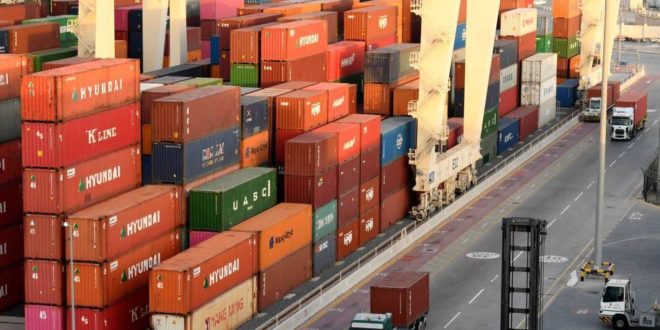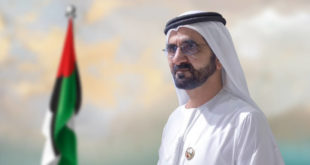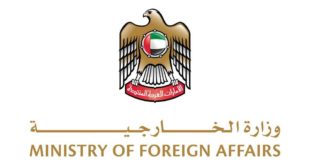The UAE’s non-oil foreign trade continued to achieve unprecedented records after it crossed for the first time in its history the two-trillion dirham barrier, recording 2.23 trillion dirhams in 2022, a growth of 17% compared to 2021.
The state’s trade had continued to record record growth rates since its recovery from the negative repercussions of the Covid-19 pandemic, which had negatively affected global trade flows, and after the state’s trade had declined in 2020 by 12%, recording 1.496 trillion dirhams, it jumped with a growth rate. 28% in 2021, achieving 1.911 trillion dirhams, to continue its upward trend strongly in 2022, exceeding expectations for a growth of 17%.
According to a report issued by the Ministry of Economy on indicators and results of the country’s non-oil foreign trade, these unprecedented historical figures came in 2022, supported by a record growth in non-oil exports, in a new indication of the success of the national economy diversification plans as well as the strategy of expanding the network of trading partners. And non-oil national exports achieved a record in 2022, recording 366 billion dirhams ($100 billion) for the first time in its history, with a growth of 6% compared to 2021, an increase of 38% compared to 2020, and 52% compared to 2019.
Non-oil exports record $100 billion
Re-exports amounted to 614.6 billion dirhams, a growth of 14%.
1.25 trillion dirhams of imports, a growth of 22%
The state’s non-oil exports with the top 10 trading partners also recorded a growth of 7%. Gold, aluminum, oils and cigarettes maintained their position at the forefront of the country’s most important exports. In parallel, iron exports witnessed the highest growth in 2022, followed by jewelry.
The contribution of non-oil national exports to the country’s total foreign trade amounted to 16.4%, despite the significant growth in both imports and re-exports.
Abdullah bin Touq Al Marri, Minister of Economy, emphasized that the historical results of the UAE’s non-oil foreign trade come as a translation of the forward-looking vision of the wise leadership and its approach to openness and cooperation with the world in order to achieve sustainable economic growth.
He said: “The continuation of the country’s foreign trade in achieving unprecedented growth rates, despite global expectations of a slowdown in global trade, confirms the success of the country’s plans and strategies to expand its network of trading partners in conjunction with the continuation of economic diversification efforts, which was clearly reflected in the growth of the country’s non-oil exports.” ».
He added, “This historic recovery in the country’s foreign trade also confirms that plans to double the gross domestic product to 3 trillion dirhams by 2030, of which trade is an integral part, are also going in the right direction.”
Solid start
For his part, Dr. Thani bin Ahmed Al-Zeyoudi, Minister of State for Foreign Trade, affirmed that these historical figures for the country’s foreign trade, achieved in 2022, will be a solid starting point for continuing the country’s efforts to expand the network of strategic trading partners, in implementation of the vision and directives of the wise leadership that established the expansion of economic partnerships. The state’s global economy is at the top of the government’s priorities in 2023, which will give more impetus to the tireless efforts to conclude more comprehensive economic partnership agreements, after the UAE succeeded in 2022 in completing 3 agreements with India, Israel and Indonesia, in addition to the continuation of talks aimed at concluding More agreements with a selection of markets of strategic importance regionally and globally.
He pointed out that the countries and blocs with which the state aims to conclude agreements represent about 95% of global trade, and this trend creates more opportunities for growth and prosperity for the state’s non-oil trade to achieve the goals of the “Fifty Projects” and “We Are the Emirates 2031 Vision” aimed at Increasing the UAE’s foreign trade to 4 trillion dirhams, and increasing non-oil exports to 800 billion dirhams, in conjunction with efforts to establish the country’s position as a global business center and a preferred destination for talented, innovative and creative ideas, and a haven for foreign direct investment flows looking for promising opportunities.
Re-export
Continuing to record records, the value of re-exports in 2022 exceeded 600 billion dirhams for the first time in its history, recording 614.6 billion dirhams, a growth of 14% compared to 2021. Most of the ten main re-export markets witnessed a remarkable annual growth combined by 13% compared to 2021. 2021, noting that the rest of the countries achieved a growth of 15%, and these ten markets are: Saudi Arabia, Iraq, India, Oman, Kuwait, China, the United States, Hong Kong and Belgium. Telephones and diamonds were the two most important commodities in re-exports, but the largest growth was seen in aircraft parts, petroleum oils, headphones and auto parts.
Concurrently, the UAE’s imports set a new record by exceeding the barrier of 1.25 trillion dirhams in 2022 (1252.4 billion dirhams), for the first time in its history as well, with a growth of 22% compared to what was recorded in 2021. The country’s imports increased from most major markets. During 2022, the top 10 markets from which the UAE imports witnessed a growth of 24%. These markets are: China, India, the United States, Japan, Turkey, Saudi Arabia, Italy, Germany, Vietnam and the United Kingdom.
In general, the list of the country’s most important trading partners did not change during 2022, and the country achieved growth in total foreign trade with all of them, with the exception of Hong Kong. Together, these countries contribute 46.8% of the UAE’s non-oil trade. These ten countries are, in order: China (264.5 billion dirhams), India (180.9 billion dirhams) and Saudi Arabia (135.2 billion dirhams).
 Media ININ Economy We Trust
Media ININ Economy We Trust








